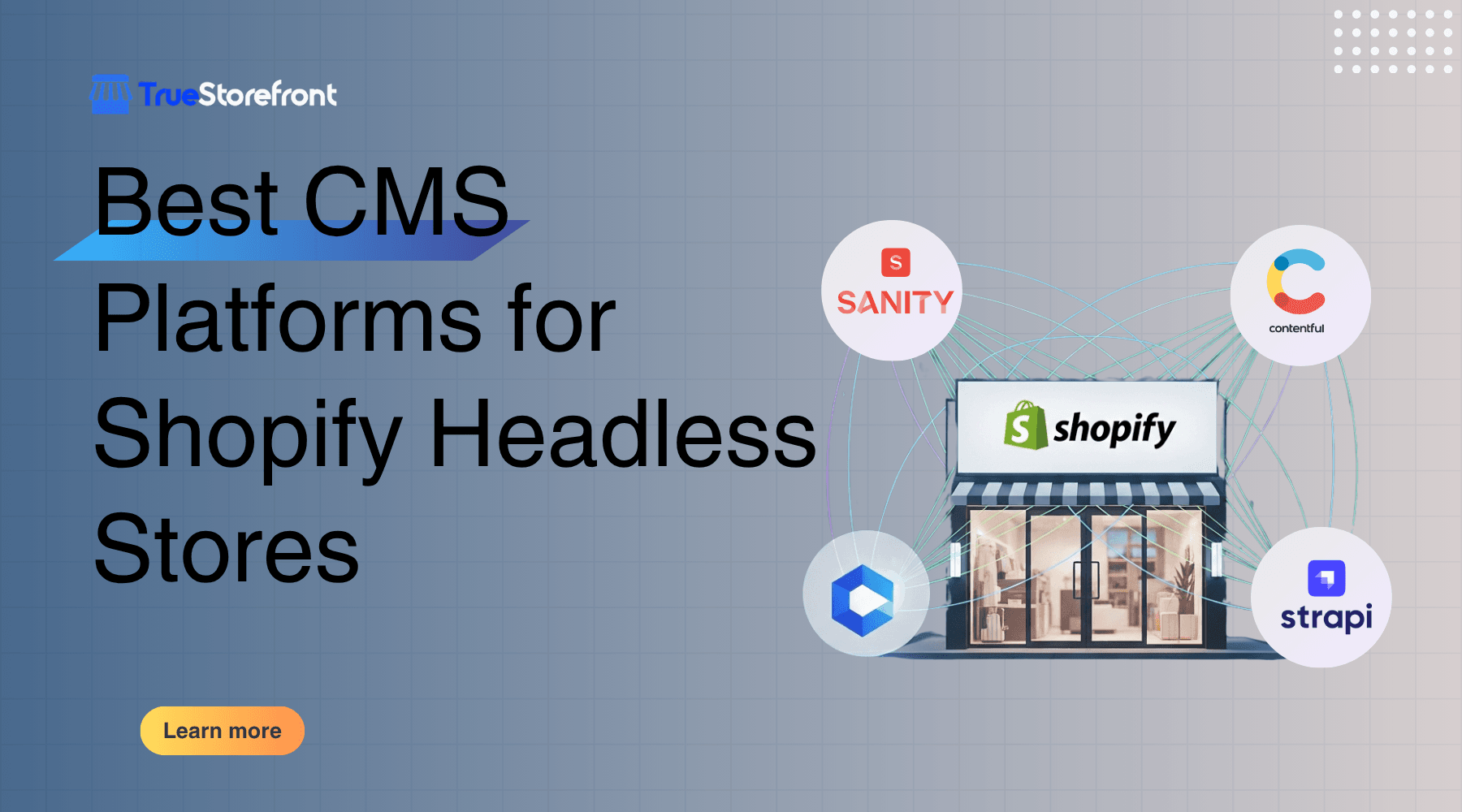In the evolving world of eCommerce, Shopify Headless has become the future for brands seeking flexibility, scalability, and lightning-fast performance. By decoupling the front end from Shopify’s back end, merchants gain complete control over how their storefront looks and behaves. However, to make the most of this setup, a powerful Content Management System (CMS) is essential.
This article explores the best CMS platforms for Shopify Headless stores — Sanity, Contentful, and Strap - helping you choose the right one for your brand’s unique needs.
I. Why You Need a Headless CMS for Shopify Headless Stores
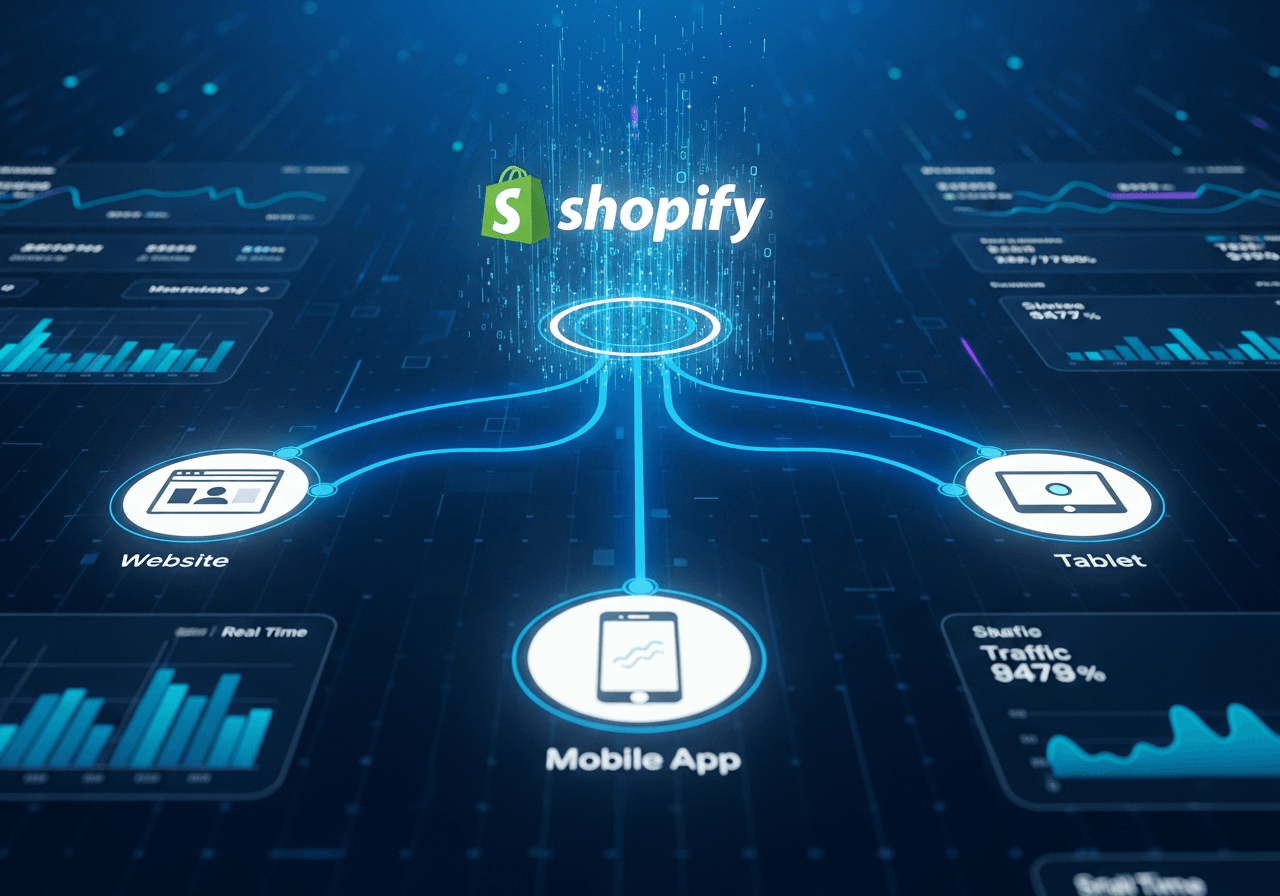
Traditional Shopify setups limit how content is created and managed. With Shopify Headless CMS integration, content creation becomes more dynamic and personalized. Here are key advantages:
- Faster content updates: Non-technical teams can edit pages without developer intervention.
- Omnichannel publishing: Deliver consistent content across your store, mobile apps, and digital channels.
- Improved SEO performance: Clean content structure and fast-loading pages support better rankings.
- Scalability: Manage multiple storefronts, regions, and languages from one CMS backend.
A Headless CMS integration essentially transforms Shopify into a flexible, API-driven ecosystem where your content and commerce coexist seamlessly.
II. Top CMS Platforms for Shopify Headless Integration
Let’s explore the most powerful CMS solutions that integrate perfectly with Shopify Headless: Sanity, Contentful, and Strapi.
1. Sanity – Real-time and Developer-friendly
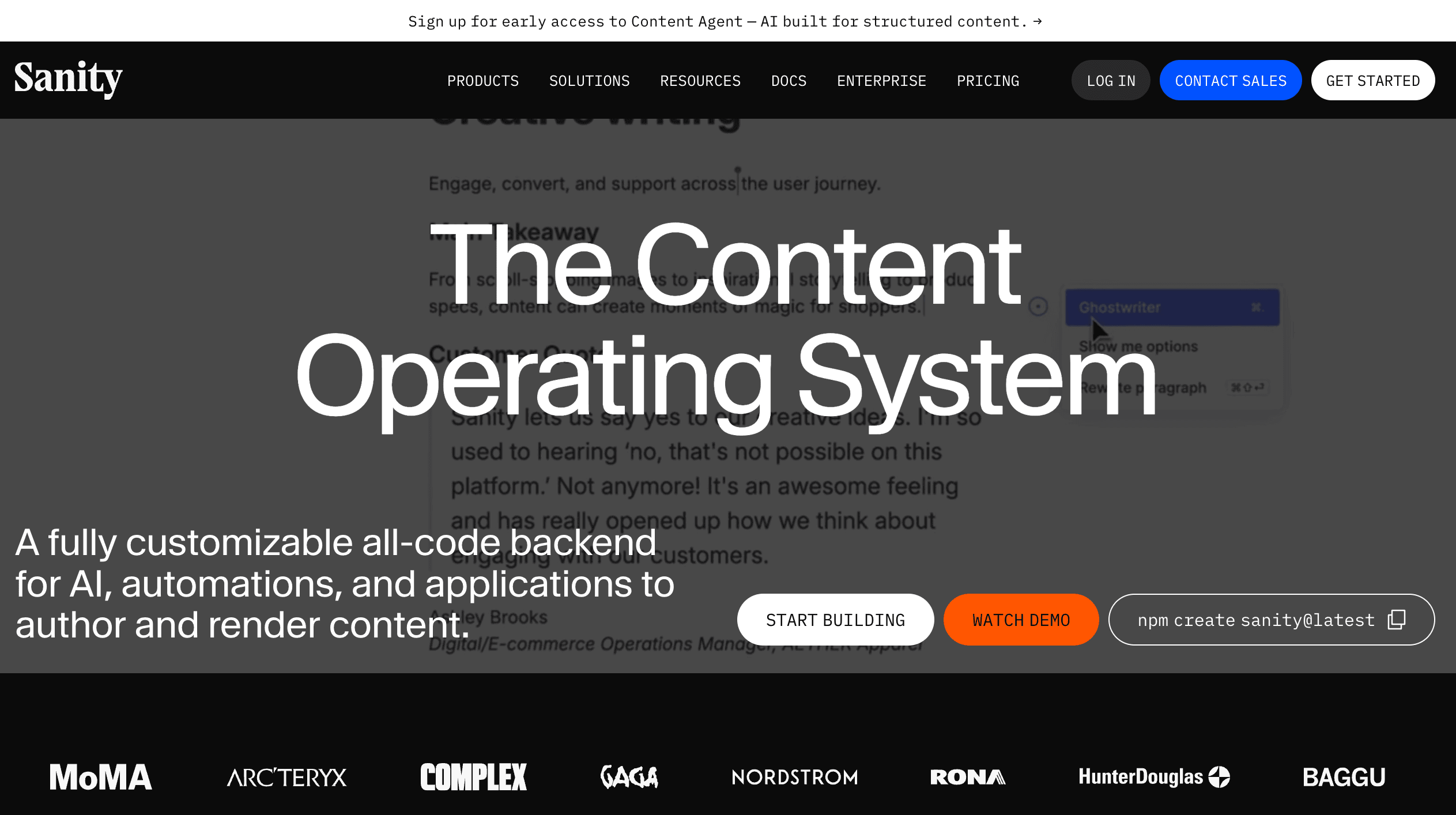
Overview: Sanity is one of the most popular choices for Shopify Headless stores. It provides a real-time content backend and a customizable editing environment called Sanity Studio. The platform is known for its flexible APIs and ability to handle structured content with ease.
Key Features:
- Real-time collaboration: Teams can edit content simultaneously without conflicts.
- Structured content model: Define reusable content blocks for better scalability.
- GraphQL & GROQ support: Developers can query exactly the data they need.
- Shopify integration plugins: Easily connect product data, inventory, and storefront elements.
- Custom workflows: Manage content publishing with version control and role-based permissions.
Best For: Growing brands that need flexibility, real-time content editing, and advanced developer control.
Pros:
- Highly customizable
- Excellent documentation and developer community
- Real-time editing and previews
Cons:
- Requires some setup knowledge
- Costs may rise with high data usage
Pricing:
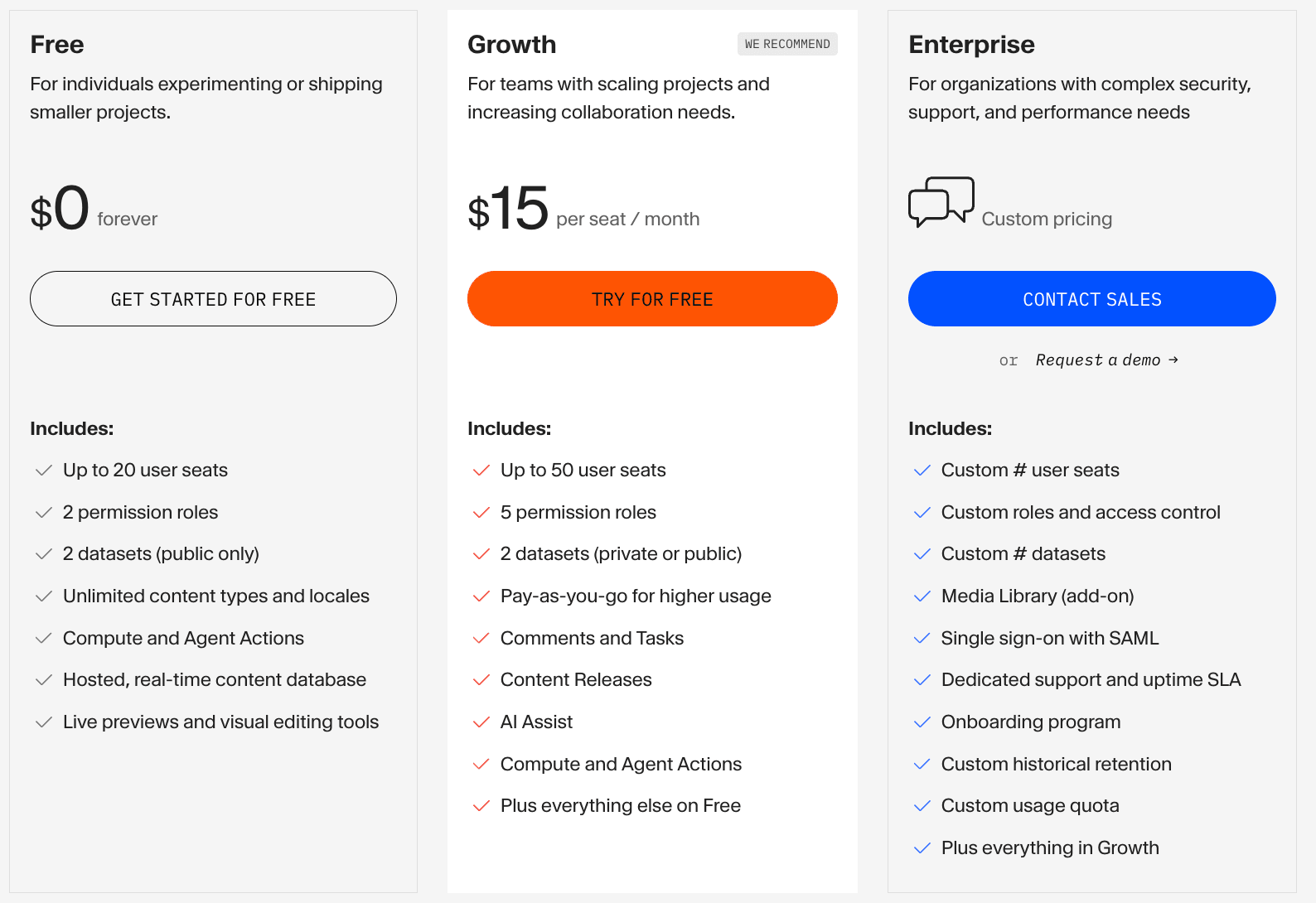
-
Free Plan: Designed for individual experimentation or smaller project deployments, the Free plan caters to individual users without cost.
-
Growth Plan – $15 per user/month: Tailored for teams engaged in scaling projects with growing collaboration demands.
-
Enterprise Plan: For organizations requiring advanced security, performance, and dedicated support, the Enterprise plan offers custom pricing based on specific needs.
2. Contentful – Enterprise-grade and Scalable
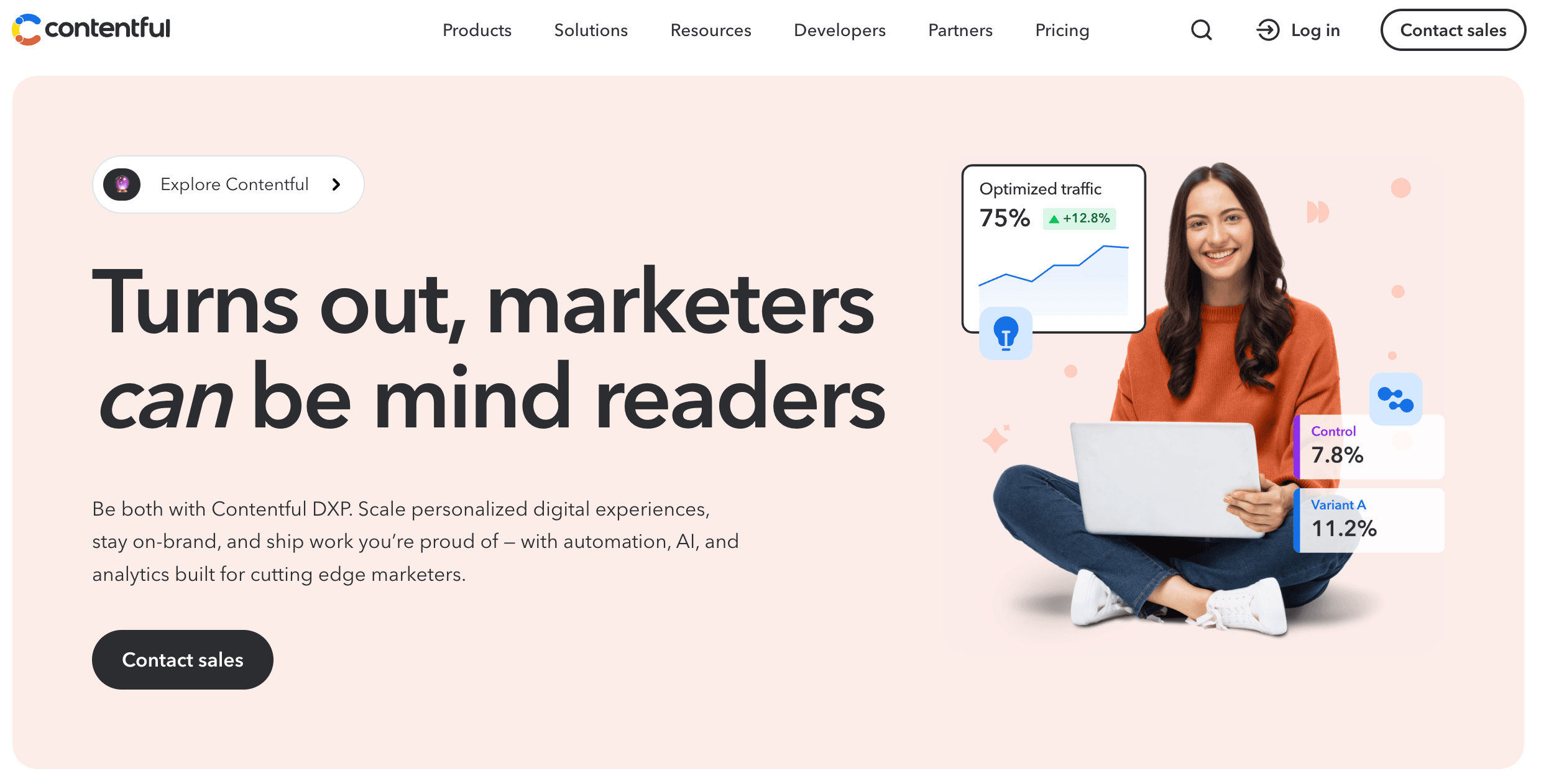 Overview:
Contentful is a leading enterprise-grade headless CMS trusted by large eCommerce brands. It focuses on API-first architecture and powerful integrations, making it a top choice for complex Shopify Headless projects.
Overview:
Contentful is a leading enterprise-grade headless CMS trusted by large eCommerce brands. It focuses on API-first architecture and powerful integrations, making it a top choice for complex Shopify Headless projects.
Key Features:
- Omnichannel content delivery: Publish across web, mobile, and IoT seamlessly.
- Robust API ecosystem: RESTful and GraphQL APIs for easy Shopify data integration.
- Content modeling tools: Build dynamic content structures tailored to your brand.
- Localization support: Manage multilingual stores effortlessly.
- Extensive integrations: Works with Gatsby, Next.js, and Hydrogen front ends.
Best For: Enterprises or large eCommerce brands that require high scalability and security.
Pros:
- Excellent uptime and performance
- Easy to integrate with Shopify’s Storefront API
- Rich plugin marketplace
Cons:
- Expensive for small startups
- Learning curve for non-technical users
Pricing:
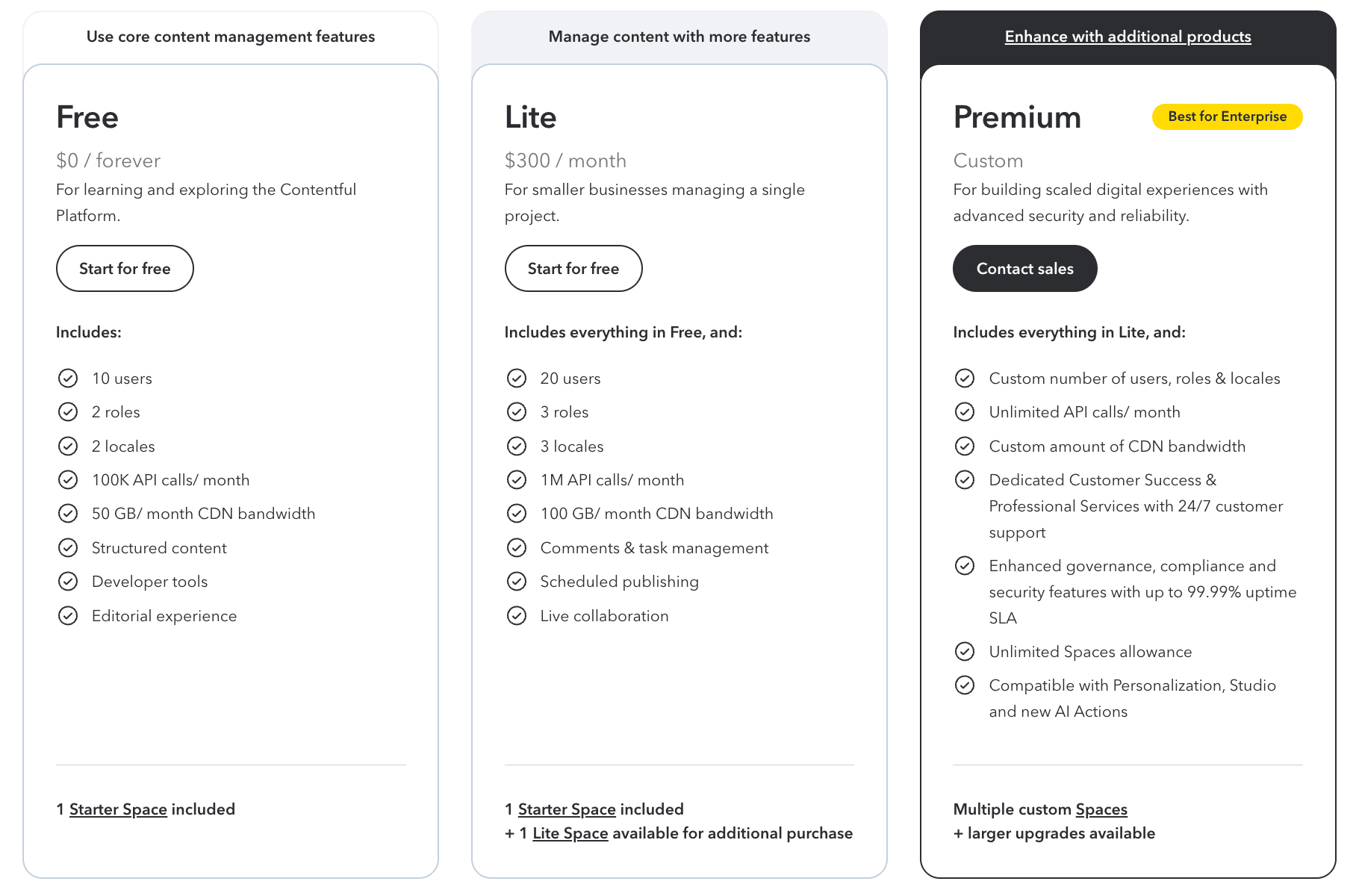
-
Free Plan: Designed for individual projects, ideal for developers and marketers at no cost.
-
Basic Plan – $300/month: Geared towards teams managing websites and app development workflows.
-
Premium Plan: Tailored for organizations seeking enterprise-level experiences with custom annual pricing, including two Intro space licenses.
3. Strapi – Open Source and Customizable
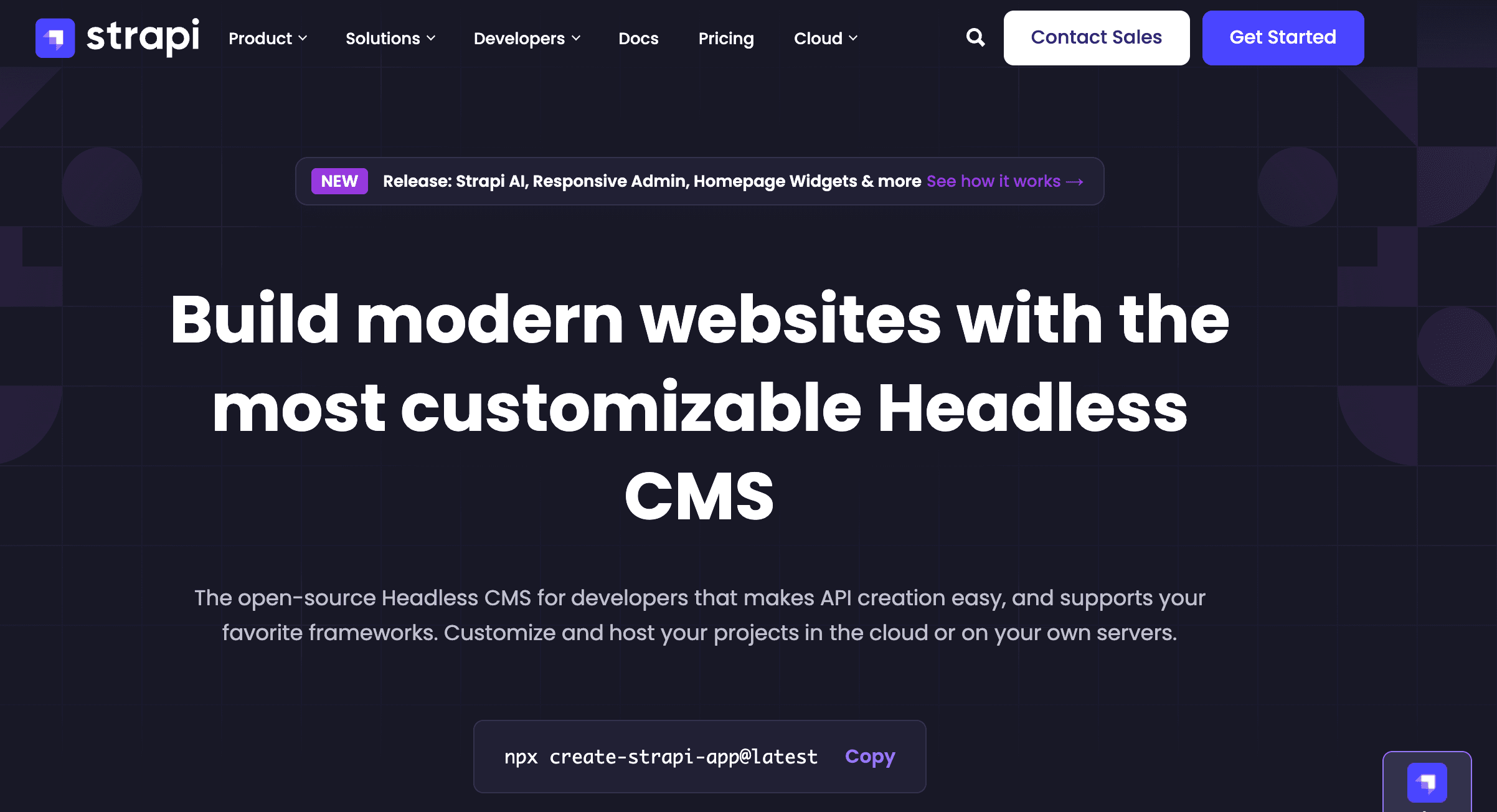 Overview:
Strapi stands out as an open-source headless CMS that offers complete customization. It provides developers with full control over the content architecture while being intuitive enough for content editors.
Overview:
Strapi stands out as an open-source headless CMS that offers complete customization. It provides developers with full control over the content architecture while being intuitive enough for content editors.
Key Features:
- Open-source flexibility: Modify the backend to fit your exact business needs.
- API-first design: Integrates with Shopify using REST or GraphQL APIs.
- Role-based access: Secure and organized content management.
- Media library management: Simplify product image and asset handling.
- Custom plugins: Extend functionality easily.
Best For: Startups or technical teams who prefer full control and flexibility without vendor lock-in.
Pros:
- 100% customizable
- Self-hosted or cloud hosting options
- Cost-effective for developers
Cons:
- Requires technical expertise
- No real-time collaboration by default
Pricing:
- Strapi CMS (Open-Source Self-Hosted)
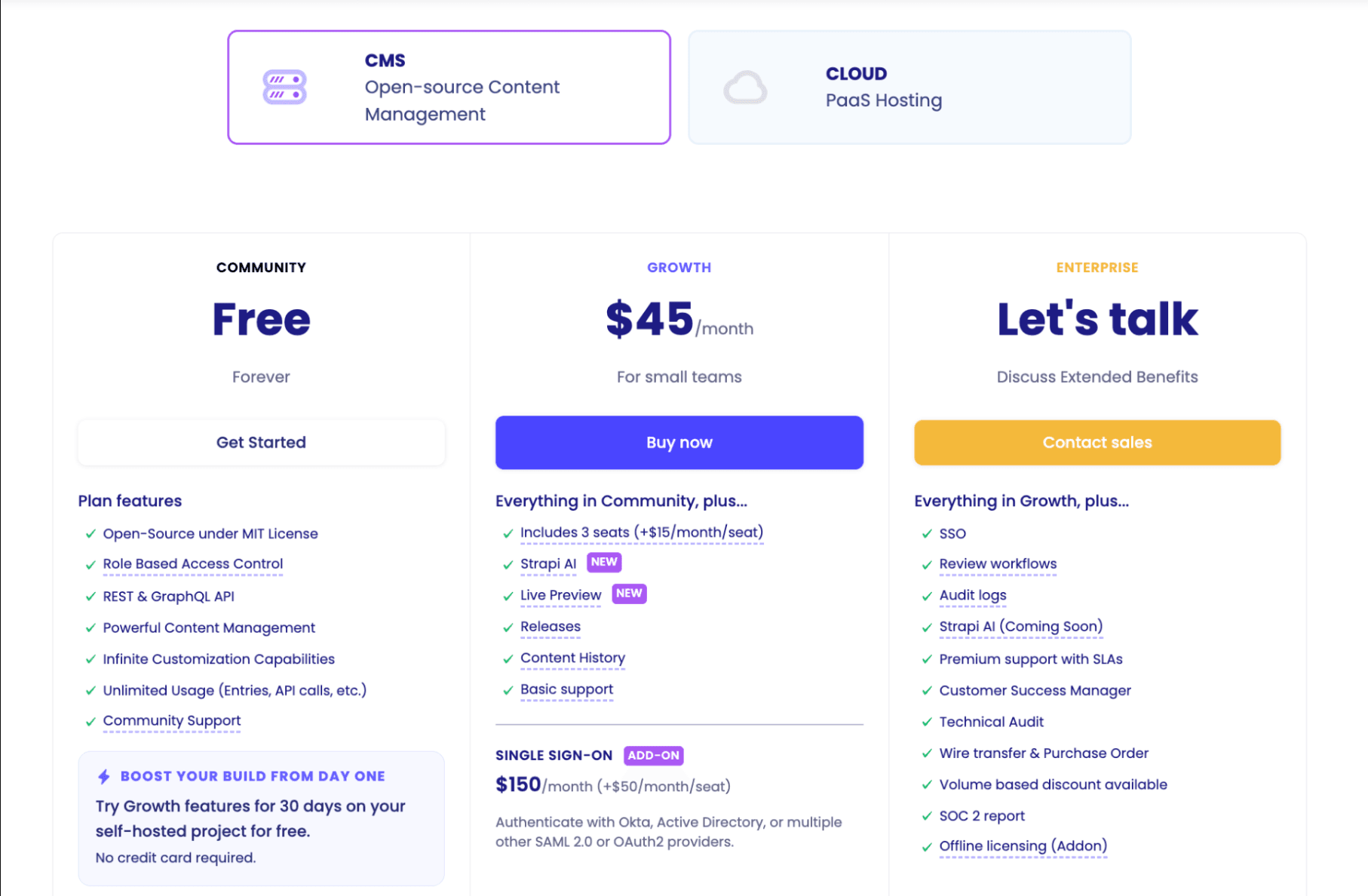
-
Community Plan – Free Forever: Ideal for developers and small teams starting with headless architecture.
-
Growth Plan – $45/month: Designed for small teams seeking advanced features and basic support.
-
Enterprise Plan – Custom Pricing: Tailored for large organizations requiring enhanced compliance, scalability, and dedicated support.
-
Strapi Cloud (Fully Managed Hosting)
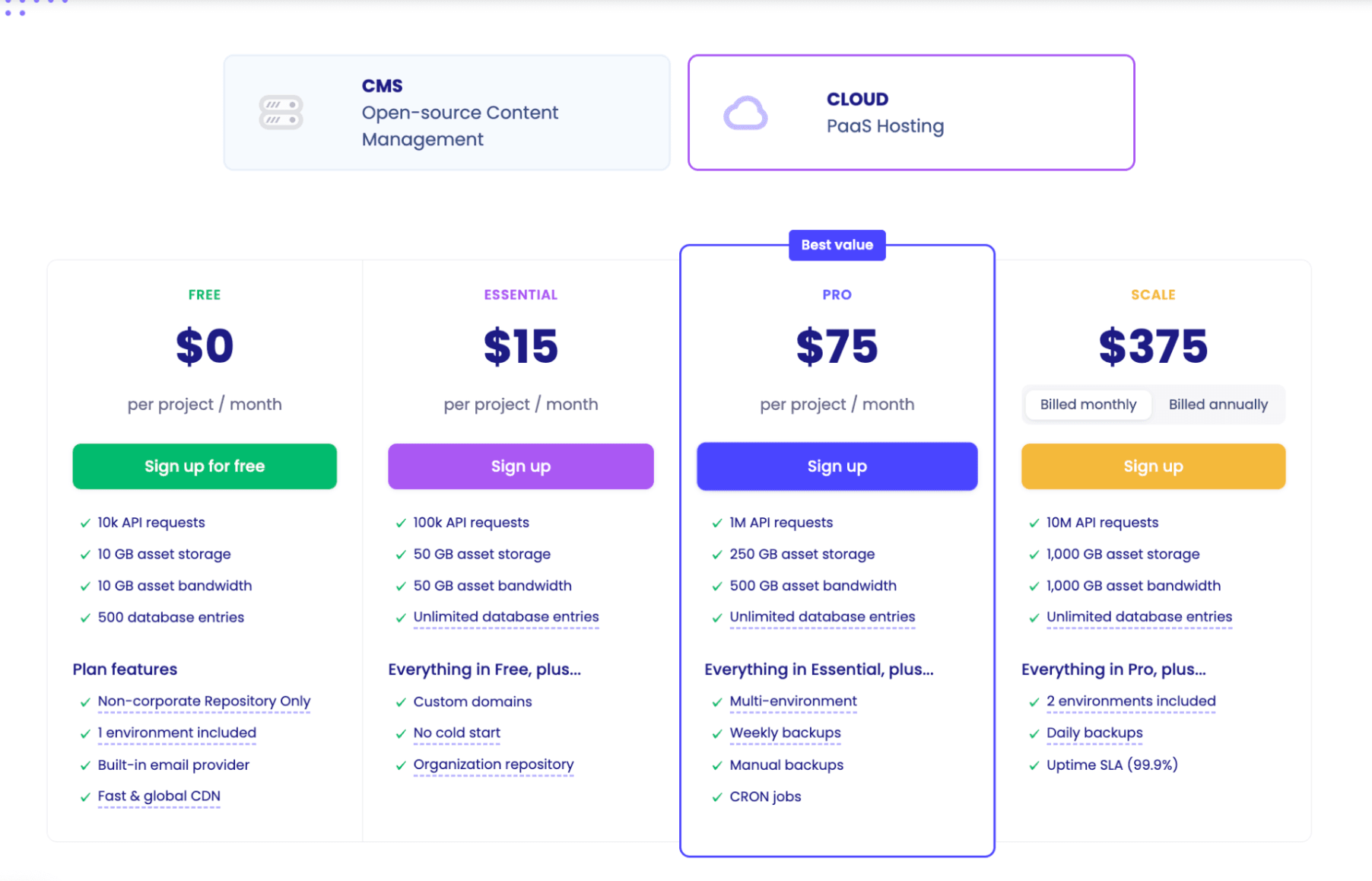
- Free Plan – $0/month: Perfect for testing projects or small prototypes.
- Essential Plan – $15/month per project: Best for startups scaling their first production store.
- Pro Plan – $75/month per project: Ideal for growing eCommerce teams.
- Scale Plan – $375/month per project: Built for high-traffic and enterprise-grade deployments.
III. Comparison Table: Shopify Headless CMS Options
IV. How to Choose the Right Headless CMS for Your Shopify Store
When choosing a Shopify Headless CMS, consider the following factors:
-
Team Skill Level:
- Non-technical teams benefit from Sanity’s real-time studio.
- Developer-heavy teams prefer Strapi’s customization.
-
Scalability Needs:
- Contentful excels in handling complex, multi-regional operations.
-
Budget:
- Strapi offers a cost-effective option.
- Sanity and Contentful scale well for larger budgets.
-
Integration Flexibility:
- Ensure your CMS supports APIs compatible with Shopify Storefront or Hydrogen.
Selecting the right CMS ensures your Shopify Headless store operates efficiently across all touchpoints, delivering a seamless omnichannel experience.
V. Best Practices for Headless CMS Integration
To make the most of your headless CMS integration, follow these best practices:
- Use GraphQL APIs for faster data delivery between Shopify and CMS.
- Implement preview environments to test content before publishing.
- Automate builds and deployments with frameworks like Next.js or Gatsby.
- Leverage caching and CDN to boost page speed and SEO.
- Ensure consistency between CMS content and Shopify product data.
With the right setup, your Shopify Headless CMS can become a growth engine for SEO, conversion rates, and brand storytelling.
Conclusion
Integrating a headless CMS with your Shopify Headless store unlocks unmatched flexibility and control. Whether you choose Sanity for its real-time collaboration, Contentful for enterprise scalability, or Strapi for open-source freedom, each platform empowers your eCommerce brand to create richer digital experiences.
Each solution serves different business sizes and technical needs, but all share one goal: enabling your brand to manage and deliver content faster, smarter, and more efficiently.
Ready to discover which CMS suits your Shopify Headless store best? Find Your Perfect CMS and elevate your eCommerce content experience today.
